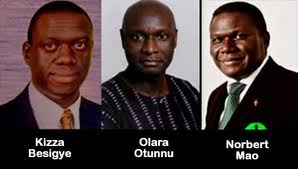FP Magazine asks: What is Museveni afraid of?
By Online Team
16th April 2012:
The NRM government’s continued crackdown on opposition activities, especially against Activists for Change [A4C], has attracted the attention of an international foreign policy analysis magazine, Foreign Policy, and caused it to ask what President Yoweri Museveni is afraid of. In an article published last week, April 13, the author Jackee Budesta Batanda said:
Questioning the change Yoweri Museveni promised Ugandans when he seized power in 1986, two university students, Ibrahim Bagaya and Doreen Nyanjura, have written a book, Is this the Fundamental Change?, juxtaposing Museveni’s speeches with Uganda’s present realities.
A scheduled book launch for April 11 in Constitutional Square, the heart of the capital of Kampala, did not take place, however. In a scenario now common in Uganda, Bagaya and Nyanjura were arrested and detained for “inciting violence.”
While political rallies in Constitutional Square are banned, police have denied receiving a letter from the organizers informing them of their scheduled gathering. The police say they will press charges against the students.
The book — with a foreword by the Hon. Nandala Mafabi, leader of the opposition in parliament — is widely seen as anti-government. In Uganda, writing a book critical of the president or ruling party is considered by the authorities to be synonymous with inciting violence.
These latest events mark a growing trend of Ugandans writing books critiquing the Museveni regime. The government response in all these cases has been to arrest the authors, thus bringing them untold fame and actually publicizing and popularizing the books in question, which otherwise might not have sold many copies.
The book release was scheduled to coincide with the one-year anniversary of the formation of Activists for Change (A4C), the pressure group behind the “Walk to Work” protests against rising food and fuel prices. Early last week, Attorney General Peter Nyombi invoked the Penal Code Act and banned the group, a move highly criticized by civil society groups.
But government suppression of dissent is only making the people involved more determined, and also wins them public sympathy. Clearly, it is the issues that lure people to join demonstrations that need to be addressed: Until the people see government commitment to improving basic services and infrastructure, disgruntlement will continue to grow.
In a country where the gap between the rich and the poor is growing, there are more and more angry young people. Uganda’s Daily Monitor ran an article on the number of unemployed in the country, arguing that they are a ticking time bomb for the establishment. There is also a great discrepancy in wealth between those who fought in the liberation war and those who did not.
While the government is investing more in the security forces (reports show that Uganda has, for the first time, exceeded Kenya in military spending), it is doing very little when it comes to providing services for the people and improving infrastructure. (The current state of public infrastructure in this country is appalling).
For years the youth were told about the “bad days” of previous regimes. But this rhetoric is like a history book sitting on a shelf gathering dust. For many of the Museveni generation (those born after 1986), given the state of hopelessness many of them face, the “bad days” are now.
Indeed, this appears to be the most challenging time of Museveni’s presidency. Protests are increasing. Many Ugandans with no personal memory of the previous regimes understand that they are being led down the road. They are growing more critical of the government and want to see the state of affairs improve. They want change.
Last year, Vincent Nzaramba was arrested for writing a book calling for the President to leave power. Now, with Ibrahim Bagaya and Doreen Nyanjura joining the fray, one only wonders how many more young people are becoming critical and penning their views.
For some time, Ugandans believed the younger generation was apolitical, but these events should serve to change our minds. They are only the beginnings of growing political activism among the previously disinterested youth.
Since the February 2011 elections, however, the government has maintained that having won the election by 68%, President got a resounding mandate to govern and therefore has nothing to fear. END. Please login to www.ugandacorrespondent.com every Monday to read our top stories and anytime mid-week for our news updates.
![]()


